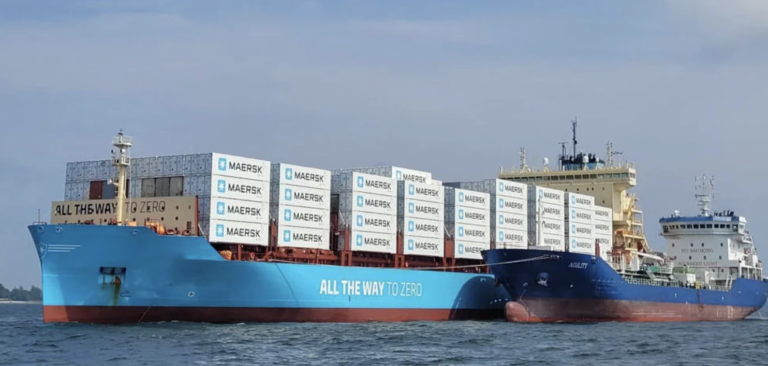AP Moller – Maersk (Maersk) has signed an agreement with Equinor for the supply of green methanol for its latest methanol-enabled feeder vessel during its first months of operation, beginning September 2023 and lasting until the first half of 2024.
The agreement secures a green methanol supply for the vessel when it enters service on a circuit from Northern Europe into the Baltic Sea following an upcoming name giving ceremony in September 2023 in Copenhagen, Denmark. The green methanol will be bunkered in Rotterdam, Amsterdam.
The biomethanol is made using biogas from manure, which is upgraded to biomethane and injected into the existing gas grid. The methanol is then produced from the biomethane in the grid on a mass-balance basis. The biomethanol is ISCC EU-certified in accordance with the EU Renewable Energy Directive.
“Equinor is pleased to be partnering up with Maersk in delivering greener fuels to the marine industry,” said Alex Grant, senior vice president for the liquid commodity segment, Equinor. “Equinor is an established player in the European methanol market through its production plant at Tjeldbergodden and we have ambitions to be a key provider of green methanol in the marine fuel segment.”
“We are very pleased to partner with Equinor, as it’s entering this business area,” added Rabab Boulos, chief infrastructure officer, AP Moller – Maersk. “It is critical to get energy majors to the table and start supplying future fuels at scale. This is the form of engagement we need to continue accelerating the pioneering journey toward a green fuel economy for global shipping.
“With more than 100 methanol enabled vessels on order across the industry, the demand for green fuel production is rising and will continue to do so in the years to come.”
In the long term, the feeder vessel will be fueled by e-methanol from a facility in Southern Denmark operated by European Energy. It is estimated that this site will come on-stream in the first six months of 2024.
Maersk has a 2040 target of net-zero greenhouse gas emissions and seeks to transport at least 25% of its ocean cargo using green fuels by 2030. At present, the company has 24 additional methanol vessels on order which are scheduled to be delivered between 2024 and 2027 and has a policy to order only new, owned vessels with a green fuel option.



